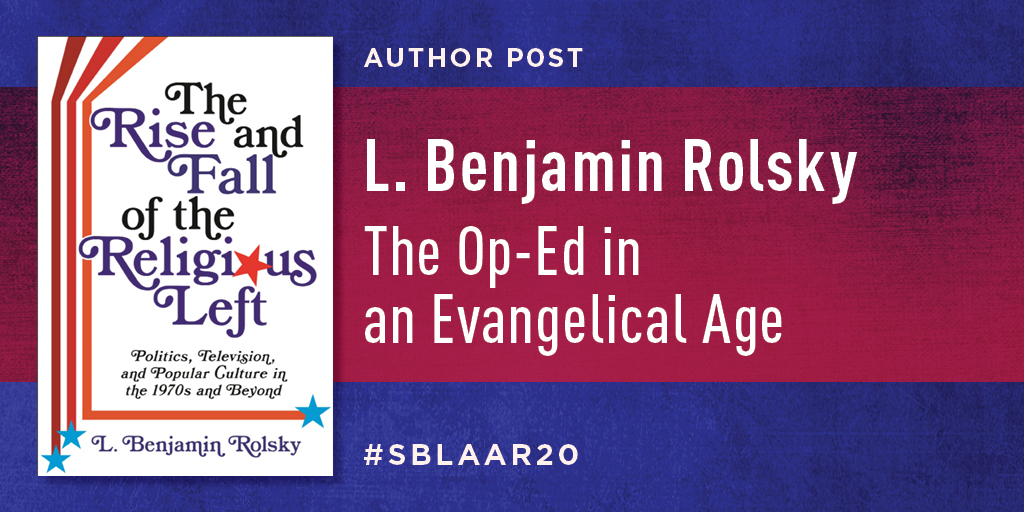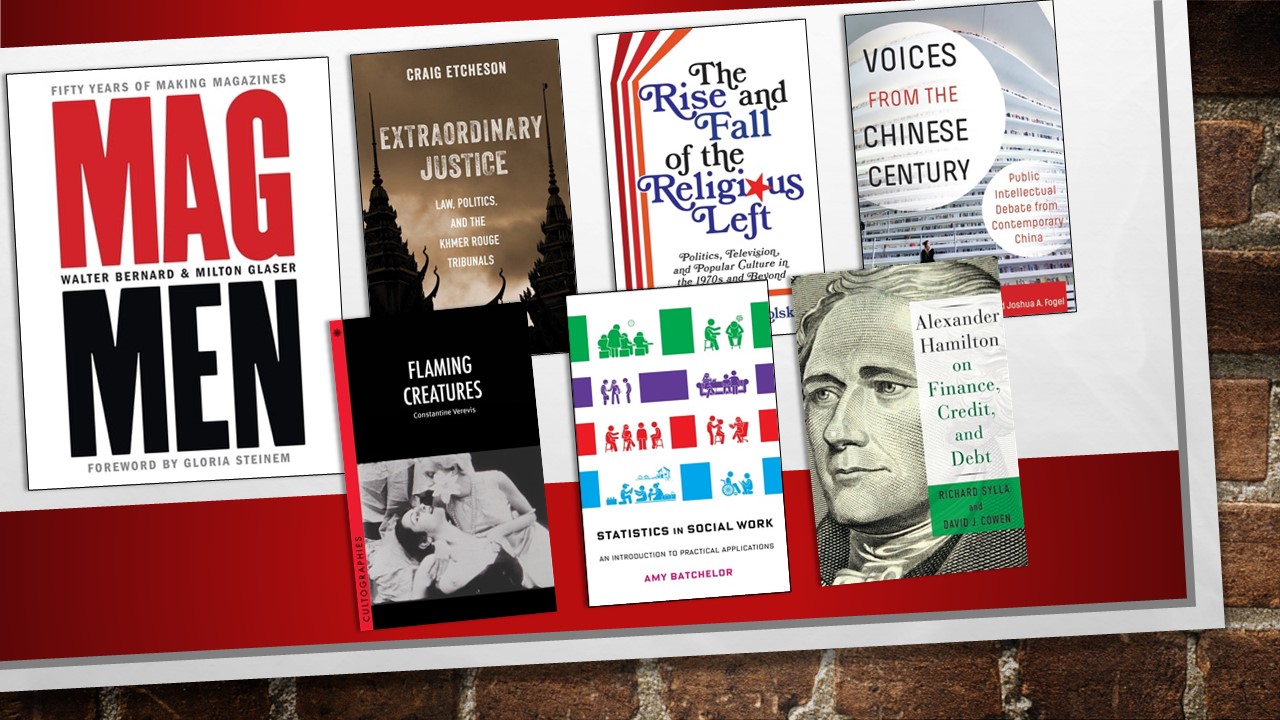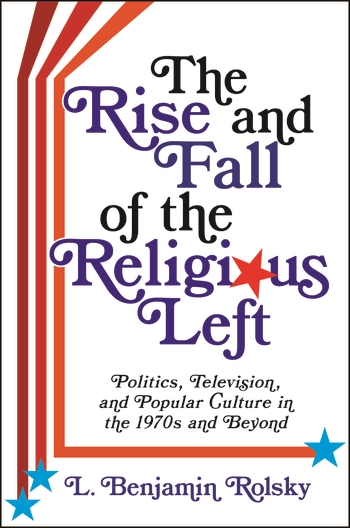The Op-Ed in an Evangelical Age
By L. Benjamin Rolsky

“Rise and Fall should garner a wide and varied audience, and it appears intentionally so. It is self-consciously and transparently situated, adeptly self-described in relation to a number of subfields, scholars, and paradigmatic shifts.”
~CARA BURNIDGE, Society for U.S. Intellectual History
Today’s AAR/SBL Annual Meetings Exhibit post comes to us from L. Benjamin Rolsky, author of The Rise and Fall of the Religious Left: Politics, Television, and Popular Culture in the 1970s and Beyond. In this piece, Rolsky critically examines how both political commentary and academic analysis shape ideas about who Evangelicals are in American public life, and what they have been in the recent religious past.
• • • • • •
This past March, the New York Times published an op-ed titled, “The Road to Coronavirus Hell Was Paved by Evangelicals,” authored by investigative journalist Katherine Stewart. In the piece, Stewart contends that since at least since the nineteenth century “hostility to science has characterized the more extreme forms of religious nationalism in the United States.” She goes on to contend that religious nationalism “has brought to American politics the conviction that our political differences are a battle between absolute evil and absolute good.” Stewart concludes her piece by citing the behavior of a number of pastors and government officials who possess Christian nationalist tendencies to disobey common sense, including former presidential candidate Ben Carson. “When a strong centralized response is needed from the federal government, it doesn’t help to have an administration that has never believed in a federal government serving the public good.”
Due to the less-than-clear articulation of the relationship between American evangelicalism and Christian nationalism by the author (and perhaps other reasons), the Times decided to change the op-ed’s title to “The Religious Right’s Hostility to Science Is Crippling Our Coronavirus Response.” While somewhat more responsible to the op-ed’s actual contents, the Times’ decision to change the title says more about the consumption of evangelicals as an object of media scrutiny than it does about evangelicals themselves. While utterly hyperbolic, the article’s initial title at least used the word evangelical as its subject matter, since presumably that’s what Stewart is examining. Upon closer inspection, Stewart uses the word evangelical only once in the entire op-ed. How can a virus be the fault of an entire group of people since the nineteenth century when they are never literally named in the piece? Instead of using the word evangelical, Stewart writes “Christian nationalist.” This is more than likely the case because Stewart is selling a book on the same topic.
“Such a pattern of academic and journalistic analysis is poor scholarship at best, and intellectual malpractice at worst.”
Stewart’s op-ed is emblematic of an intellectual tradition of analysis that has been ongoing since at least the mid-century writings of American sociologist Daniel Bell. Published in 1956, The New American Right presented its readers with what Bell himself referred to as a “remarkable convergence in point of view.” Bell and others saw what one reviewer called “the McCarthyite mentality and the conditions that foster it” in the actions of conservative Protestants the country over. By the early 1970s, numerous progressive theologians and commentators began asking questions about “born again politics” and their potential impact on American public life and its First Amendment protections. Titles such as The Politics of Doomsday: Fundamentalists of the Far Right began popping up in the academic literature on American evangelicalism, and, by the early 1980s, liberal Protestant periodicals were again asking the question in specially titled forums in the Christian Century, “What’s Wrong with Born Again Politics? A Symposium.” Despite the fact that President Jimmy Carter had introduced the country to the language and grammar of being “born again” in the public square, less than four years later, such witnessing had become the bane of progressive Protestant existence. Such a pattern of academic and journalistic analysis is poor scholarship at best, and intellectual malpractice at worst.
In many ways, we are currently living through what one historian has called an “evangelical scare.” In The Age of Evangelicalism: America’s Born Again Years, historian Steven Miller (no, not that Stephen Miller) argues that America’s first evangelical scare was catalyzed by the formation of the nonprofit organization People for the American Way (PFAW). Its founder, television producer and writer Norman Lear, not only helped shape “the tone and course of liberalism in the late twentieth century,” using such phrases as “moral monopolists” and “moral authoritarians,” but he also helped produce “the evangelical” itself: the most prominent trope of American public life since America’s mid-century. Such scares, including the one we’re currently in, reproduce the idea that something “novel” is going on with the “rise” of the Christian right and its theocratic ambitions. For Miller, this is anything but logical, once set against the longer history of American religion and politics. “Selective amnesia served a useful rhetorical purpose, not least because Christian Right leaders wanted to paint the exaltation of tolerance as the real historic aberration.”
“This moment is also terrifying because we have witnessed, yet again, a substantive and vocal Protestant community backing the actions of a seemingly depraved man.”
For many, our theological present is equally terrifying. Just recently, an op-ed in First Things argued that a corrosive form of sentimentalism consumes our popular culture because we are obsessed with saving every life possible that is affected by the coronavirus. Aren’t there more important things to worry about—as the op-ed suggested? Like liberty? Or justice? This moment is also terrifying because we have witnessed, yet again, a substantive and vocal Protestant community backing the actions of a seemingly depraved man. But what if this is why the former president was supported so thoroughly to begin with? Instead of naming false consciousnesses or status anxiety as the primary explanations for evangelical support of Trump, why not ask about the doctrine of evangelical salvation? Or the nature of sin in evangelical theology? Or the importance of the evangelical witness, or story, in one’s Christian journey? Academic defenses of Stewart’s op-ed have attempted to cover for Stewart and the Times’s initial blunder, but I’m wondering why. Why not own this moment as an intellectual abstraction meant to demonize instead of understand?
Moving forward, instead of continuing to lambaste and name call, perhaps we should be asking ourselves collectively how we can do a better job informing the public of what’s happening in the evangelical community, historically and in the present, as diverse as it is. In many ways, one could argue that the intellectual obsession with white conservative evangelicals since 2015 has unintentionally “whitened” the field of study itself, thereby resulting in a relative paucity of research on evangelicals of color. As one of my colleagues recently observed on social media, “May we get just as many pieces from black barber shops and city community centers as we did from rural diners over the last 4 years!” The rise and fall of Donald Trump served as the catalyst of a third evangelical scare not because of the evangelicals in this age but because of the evangelical age we currently inhabit. Once again, American Christians the country over are having to ask themselves the perennial question of the Protestant faith: what does it mean to be saved? To most, the jury is still very much out.
Save 20 percent on our conference titles on display when you use coupon code AAR20 at checkout from our website by December 31, 2020.
1 Response
Leave a Reply
You must be logged in to post a comment.









Dr. Rolsky recently published a review essay for the L.A. Review of Books (LARB) titled, “Listening to the Darkness” on journalist Jeff Sharlet’s